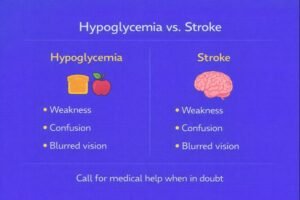Hypoglycemia and Stroke-Like Symptoms: Understanding the Differences

Hypoglycemia refers to a drop in blood glucose to levels that may interfere with normal brain and body function. It is most commonly associated with diabetes but can occur in other situations as well.
Why this matters in first aid and workplaces
Low blood sugar can cause symptoms that closely resemble a stroke. Because stroke is a medical emergency, recognizing when symptoms may be related to hypoglycemia — and responding appropriately — is important in workplaces, schools, and public settings.
Scenario: Stroke-like symptoms at a community event
During a community event, a volunteer suddenly became confused, unsteady, and had trouble speaking clearly. Emergency services were contacted due to concern for stroke. Medical assessment later determined the symptoms were related to low blood sugar, and the person recovered fully with appropriate care.
Hypoglycemia: an overview (educational)
Hypoglycemia occurs when blood glucose drops lower than what the brain needs to function normally. Causes may include:
-
Diabetes medications
-
Missed or delayed meals
-
Increased physical activity
-
Alcohol consumption
-
Certain medical conditions affecting metabolism
Symptoms can develop quickly and vary between individuals.
What is a stroke?
A stroke occurs when blood flow or oxygen supply to part of the brain is interrupted, either by a blockage (ischemic stroke) or bleeding (hemorrhagic stroke). This interruption can cause lasting brain injury.
Stroke is always a medical emergency.
Why hypoglycemia can mimic a stroke
The brain depends heavily on glucose for energy. When blood sugar drops too low, brain function may be temporarily impaired. This can produce symptoms that look very similar to stroke, even though the underlying cause is different.
Symptoms that may overlap
Both hypoglycemia and stroke can involve:
-
Weakness or unsteadiness
-
Confusion or difficulty thinking
-
Slurred or altered speech
-
Visual disturbances (blurred or double vision)
-
Headache
-
Mood or behaviour changes
-
Loss of consciousness in severe cases
Because symptoms overlap, hypoglycemia should never be assumed to be harmless, and stroke should never be ruled out without medical assessment.
Key differences (general awareness)
| Hypoglycemia | Stroke |
|---|---|
| Often reversible when identified promptly | Can cause permanent brain injury |
| Related to glucose availability | Related to blood flow or bleeding |
| May fluctuate quickly | Symptoms often persist or worsen |
These differences are not always obvious in the moment, which is why emergency evaluation is critical.
Brain effects: correcting misconceptions
Severe or prolonged hypoglycemia can be dangerous, but it does not always cause permanent brain damage, and it is not classified as a stroke. Outcomes depend on severity, duration, and how quickly care is provided.
Medical professionals use imaging and clinical assessment — not first aid — to determine cause and extent of injury.
First aid awareness: what bystanders should do
If someone shows sudden neurological symptoms:
-
Treat it as a medical emergency
-
Stay with the person
-
Ensure their safety
-
Call emergency services immediately
Do not attempt to diagnose whether it is hypoglycemia or stroke.
FAQ
Is “hypoglycemic stroke” a medical diagnosis?
No. The term is sometimes used informally to describe stroke-like symptoms from low blood sugar, but it is not a formal diagnosis.
Can hypoglycemia cause brain injury?
Severe or prolonged episodes can be harmful, but many cases resolve without lasting damage when treated promptly.
Why are symptoms so similar?
Both conditions affect brain function, though through different mechanisms.
Should stroke always be assumed?
Yes. Stroke must always be ruled out by emergency professionals.
Educational note
This article provides general awareness about hypoglycemia and stroke-like symptoms for first aid education. Diagnosis and treatment decisions are made by healthcare professionals.
